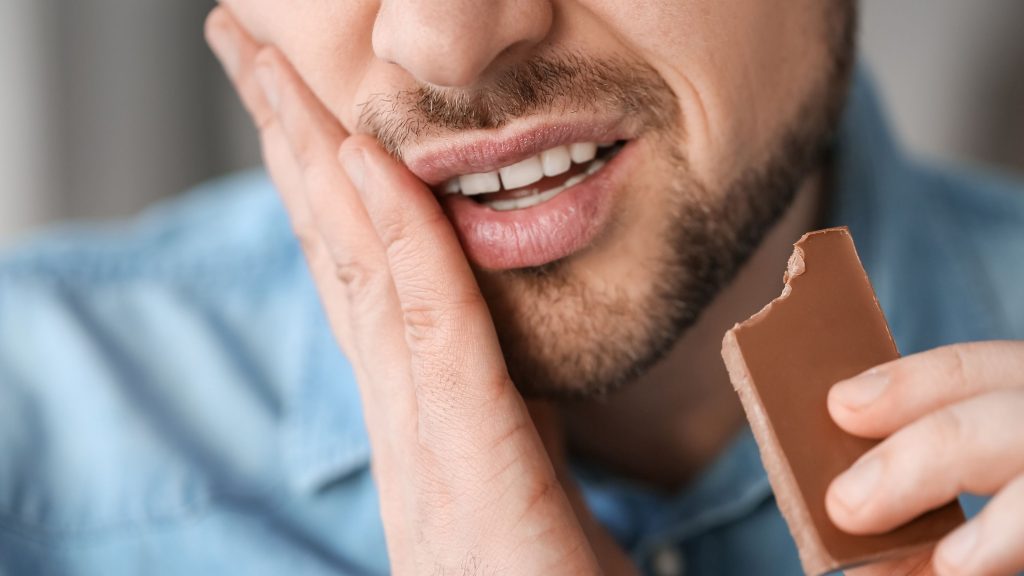Teeth sensitive to sugar affect many individuals worldwide. It causes teeth to become sensitive or painful to stimuli like hot or cold meals and beverages, acidic or sweet foods, and even air. This pain might vary from a small twinge to a strong, hours-long ache. Tooth sensitivity is painful and may make it hard to enjoy favorite meals and beverages. In this post, we will discuss dental sensitivity’s origins, remedies, and prevention:
Teeth Sensitive To Sugar – Why?


In dentistry, sugar sensitivity is discomfort or intense pain in the teeth or gums after sugar or sweet beverages. The Indiana Dental Association claims enamel loss and interaction with the tooth’s nerves and soft tissues generate sugar-sensitive teeth. Also, too much sugary food or soda consumption can lead to heightened tooth sensitivity to sweets. Moreover, studies reveal that brushing too vigorously or using a toothbrush with stiff bristles might damage enamel and cause sugar sensitivity. Periodontal disease or gum disease might raise the likelihood of sugar-sensitive teeth. In summary, your dentist will examine your enamel and gums to identify and treat sugar-sensitive teeth. Then, your doctor may offer sensitive tooth toothpaste, braces, teeth whitening, orthodontic correction, or pulp infection therapy.
What Factors Lead To Sugar Sensitivity In Teeth?
Many individuals have sugar-sensitive teeth, which may be painful. Let’s examine the major reasons for sugar-sensitive teeth, including dental care, eating habits, and oral illnesses, to better comprehend this issue.
- Enamel wear: Loss of tooth enamel is called enamel wear. The nerves and blood vessels within the tooth are exposed to external substances as the enamel wears off, causing sensitive discomfort while eating sweet foods.
- Using too much toothpaste: Many toothpaste components irritate and wear tooth enamel. Overbrushing or using too much toothpaste might make teeth sensitive to sweets.
- Eating improperly: Too much sugar in the diet might cause teeth to become more sensitive.
- Gingivitis and toothache: Pain perception may increase if enamel wears away due to inflammation of the gums and teeth.
- Pulp infection: Harmful bacteria in tooth pulp cause pulp infections. Infected pulp irritates dental nerves and blood vessels, making sweet meals painful.
- Crooked teeth: Teeth that are misaligned or crooked may be more susceptible to the damaging effects of sugary meals and beverages.
In short, having teeth that are sensitive to sugar can be painful and have a big effect on the patient’s quality of life. Recognizing the etiology of sugar-sensitive teeth is critical for early treatment and prevention.
Sugar-Sensitive Teeth Symptoms


In clinical dentistry, teeth that are sensitive to sugar are a typical complaint. Patients feel uncomfortable and find it hard to eat. For early identification and treatment, sugar-sensitive teeth signs must be recognized. Some signs of teeth that are sensitive to sugar are listed below:
- You get a sharp pain in your stomach when you eat sugary foods like candy, cakes, soft drinks, or vegetables.
- Discomfort when exposed to cold temperatures, such as those present in liquids.
- You get severe discomfort whenever you use a toothbrush.
- The experience of pain or distress originating from the teeth or gums.
In conclusion, sugar-sensitive teeth may make eating uncomfortable and ruin favorite dishes. So, if you have sugar-sensitive teeth, consult a dentist to diagnose and cure the cause.
Tips For Reducing Sugar-Sensitive Teeth


This sugar-sensitive illness may cause pain and discomfort, as well as a decrease in quality of life. Thus, sugar-sensitive teeth must be treated with dental hygiene. In this part, we’ll discover how to care for your teeth to reduce sugar sensitivity:
- Use fluoride toothpaste: Fluoride is a mineral that helps keep bacteria levels low in the mouth and shields teeth from acid damage.
- Brush properly: Brush twice a day with a gentle toothbrush to protect the enamel. To eliminate all germs and plaque, aim the toothbrush diagonally from top to bottom.
- Clean between teeth with a toothpick or floss: Dust and plaque collect between teeth, making them sensitive.
- Address dental issues: Early treatment of gingivitis, dental decay, and pulp infections may minimize sugar sensitivity.
- Adjust the diet: To protect dental enamel, avoid sweets and acidic foods like oranges, lemons, and tomatoes.
In conclusion, good dental hygiene reduces sugar-sensitive teeth. If you have this problem, follow the aforementioned steps and see your dentist.
Treating Sugar-Sensitive Teeth
Teeth that are sensitive to sugar are a frequent oral health issue that may have far-reaching consequences for a person’s well-being. Therefore, appropriate dental care is crucial. From home cures to dental clinic treatments, we’ll learn about sugar-sensitive tooth therapies in the following part:
Home Cures
If you find that consuming sugary foods causes pain in your teeth, read on; we’ll discuss home remedies for sugar-sensitive teeth. These modest treatments minimize sugar-induced pain and discomfort. Start discovering!
- Use fluoride toothpaste: Using fluoride toothpaste may prevent tooth decay and lessen the effects of sugar on your teeth.
- Sensitive toothpaste: To help shield enamel and lessen sugar sensitivity, use a toothpaste designed for sensitive teeth.
- Limit the use of sugary drinks: Avoiding sugary beverages, particularly carbonated ones, might help calm anxious sensations.
- Adjust your diet: Eating right and limiting sugary foods can help reduce sensitivity.
- Use a tooth-sensitizing patch: Drugstore and retail tooth-sensitizing patches protect teeth and minimize sugar sensitivity.
However, if the sensation of sugar sensitivity does not improve after applying home remedies, you should see your dentist for a timely examination and treatment.
Dentistry For Sugar-Sensitive Teeth
Sugar-sensitive teeth are prevalent and may make living difficult. Therefore, many patients seek effective therapies to lessen symptoms and enhance their quality of life. In this part, we’ll learn about successful in-office sugar-sensitive tooth treatments.
- Gum displacement surgery: Gingival displacement surgery may fix the gap and decrease tooth sensitivity caused by retracted gums.
- Enamel polishing: Your dentist may polish your enamel to smooth it, minimize pain, and protect it if it’s worn.
- Taking a dental film: A dental film helps the clinician locate and assess tooth damage, allowing for proper treatment.
- Use special medicines: Your doctor may prescribe fluoride toothpaste or Gluma to ease discomfort and preserve teeth.
- Fillings: If your teeth are open or decayed, your dentist may perform a filling to create a protective surface and reduce pain.
- Orthodontics: Your doctor may offer orthodontic therapy for sensitive teeth caused by the oral structure.
The foregoing dental procedures lessen sugar-related pain and discomfort. However, frequent medical visits and following treatment directions will provide the greatest outcomes.
Conclusion


In short, care and treatment for teeth that are sensitive to sugar, both at home and at the dentist, are discussed above. However, regular oral hygiene and medical checkups and treatment at the dentist are essential for preventing dental health issues including sensitive teeth, gingivitis, and tooth decay. Thus, we propose Spring Orchid Dental Clinic for preventative and curative dental care. This professional location has skilled dentists and the latest technology to provide you with the healthiest and most attractive teeth.
FAQs
If You Don’t Address Sugar Sensitivity, Would It Cause Further Problems?
Yes, periodontitis, gingivitis, and tooth loss may develop from teeth that are too sensitive to sugar if they aren’t addressed. Without adequate hygiene, bacteria may cause damage to teeth and gums. Left ignored, dental problems may lead to tooth loss and make eating a challenge. Thus, if you have tooth sensitivity to sweets or other dental concerns, see a dentist promptly.
Is Pain After Sweets A Concern For Kids?
If it occurs seldom, children’s toothaches after eating sweets aren’t a problem. Due to underdeveloped teeth, children may suffer brief sugar sensitivity. However, if your kid develops a toothache after eating sweets often and for a long time, it may be an indication of a more severe issue and should be seen by a dentist.





